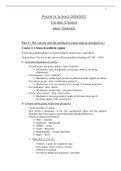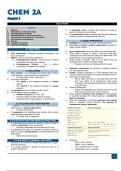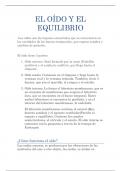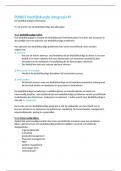1
POLITICAL SCIENCE 2020/2021
COURSE: CITIZENS
PROF. THIJSSEN
Part A: The citizen and the political system (macro perspective)
Course 1: Citizen & political regime
From king philosophers to representative democracy, and back
General focus: The role of the citizen in Western political thinking (427 BC – 1920)
Increasing importance of citizens
− For politicians and policy makers - their ‘followers’
Mechanism: party dealignment, increasing volatility, declining
pillarization
− For journalists - their ‘clickbait’s’
Mechanism: market logic, decline of pillarized media, digital revolution
− For interest groups - their ‘mobilization potential’
Mechanism: your own interest is not enough, disowning projection
− For companies - their ‘clients’
Mechanism: market logic, consumer fickleness
− For the other citizens - their ‘social mirror’
Mechanism: increasing need of points of reference in an age of
declining appeal of the old churches
Citizens and the group in historical perspective
− On the shoulders of giants
− Max Weber’s antinomies of the Fall: paradisiacal ethics and the populist
Zeitgeist (between progress and freedom/individuality/difference)
− Historical dialectics/antinomies
Plato – Aristotle
Augustine – Machiavelli
Hobbes – Locke
Locke – Rousseau
Bentham/Mill – Tocqueville/Tarde
Hegel – Marx
1. Plato (427 vC-347 vC)
− ‘Politeia’ = quest for a righteous state
− From macro (state) to micro (citizen)
− Deductive reasoning
− Division of labour-specialisation is desirable
, 2
− 3 stands: labourer’s, soldiers, governors
− Importance of differences in level of education
Education is a broad concept: Music and Gymnastics
Commune, eugenics, gender neutral
− Ideal state: aristocracy/sofocracy
Power to the ‘philosopher king’
− Process of degeneration: 4 bad forms of state
Timocracy: ‘power to ambition’
Oligarchy: ‘power to wealth’
Democracy: ‘power to desire’
Tirany: ‘power to the absolute ruler’
− Public opinion= ‘deception’ (allegory of the cave)
− Knowledge versus Opinion (Doxa …cf. orthodox)
Idea versus fickle reproductions of the real
➢ Augustine (354-430) “the city of God” (indebted to Plato)
− Importance of common abstract legal principles
− Self-renunciation as an ideal
− The earthly city as educational context for the city of God
2. Aristotle (384 vC -322 vC)
− ‘Politica’ =quest for the state (political regime) that empirically proves
to be the best
− Inductive empirical reasoning
− Importance of the polis
− Polis: the community of free citizens
Man is a political and a social animal
Each citizen should occasionally assume public office
− Participatory form of citizenship
− Individual opinions are mediated by institutions
− Different forms of state that are ‘good’, which can nevertheless
degenerate
Monarchy – but danger of tyranny
Aristocracy – but danger of oligarchy
Politeia – but danger of democracy
− Disclaimer: democracy of Athens
Women, slaves, labourers, and traders are no free citizens
Democrat vision is more radical – lottery principle for jurors
➢ Thomas Van Aquinas (1225-1274) (indebted to Aristotle)
− True humanity only can be realized in the polis
3. Machiavelli (1469-1527)
− ‘Il Principe’, how can a ruler hold on to his/her power?
− Importance of secrecy (official secrets) openness, public(ity)
− Empirical (inductive) and anthropocentric vision
− Man is by nature striving for power
− Autocracy: power makes lonely
− Effectiveness should always be the primal goal
, 3
− But … legitimacy can never be completely neglected
The wellbeing and friendship of the people
Importance of taking care of public opinion (public reputation)
4. Hobbes (1588-1679)
− ‘Leviathan’: what is a viable political order?
− Deductive model, but … concrete motivation: religious war (Hobbes
the chicken?)
− By nature, each human is striving for power and self-maintenance
− State of nature: “life would be solitary, poor, nasty, brutish and short”
− Solution: A social contract
Externalizing problems: Sovereign with absolute power
‘embodying’ the people
‘conscience’ is a private matter: from opinion 1 to opinion 2
− Citizens are only important in establishing the social contract and in a
marginal testing of security policies (‘watchman state’)
− Body politic: bounded by the contours of the royal body
− Pluralis Majestatis: “He, Akbar (1542-1605), had never referred to
himself as ‘I’, not even in private, not even in anger or dreams. He was-
-what else could he be? – ‘we’.”
5. Locke (1632-1704)
− ‘Two treatises of government’
− By nature, each human is striving for power and self-maintenance
− State of nature: rather idyllic
− When times moves on property relations will become more unequal,
which is a fair thing according to Locke
− Solution: A social contract
Everyone resigns from his own individual power-sovereignty of
the people
‘Law of opinion and reputation’ – folkways - positive opinion²
Checks and balances – majority rule – right to revolt
Importance of general and abstract laws – rule of law
6. Rousseau (1712-1778)
− Discours sur l'origine et les fondements de l'inégalité parmi les hommes
(1755)
Genealogy of inequality to show it is not natural
− Du contrat social; ou, Principes du droit politique (1762)
“man is born free, but everywhere he is in chains”
− Point of departure: solitary man of nature
− Inequality originates in society
− Lockean social contract = pseudo-contract
− Genuine social contract relies on ‘la volonté générale’
− L’opinion publique =in the sense of not-publicly felt opinion is the only
sovereign authority
− rational critical public opinion
POLITICAL SCIENCE 2020/2021
COURSE: CITIZENS
PROF. THIJSSEN
Part A: The citizen and the political system (macro perspective)
Course 1: Citizen & political regime
From king philosophers to representative democracy, and back
General focus: The role of the citizen in Western political thinking (427 BC – 1920)
Increasing importance of citizens
− For politicians and policy makers - their ‘followers’
Mechanism: party dealignment, increasing volatility, declining
pillarization
− For journalists - their ‘clickbait’s’
Mechanism: market logic, decline of pillarized media, digital revolution
− For interest groups - their ‘mobilization potential’
Mechanism: your own interest is not enough, disowning projection
− For companies - their ‘clients’
Mechanism: market logic, consumer fickleness
− For the other citizens - their ‘social mirror’
Mechanism: increasing need of points of reference in an age of
declining appeal of the old churches
Citizens and the group in historical perspective
− On the shoulders of giants
− Max Weber’s antinomies of the Fall: paradisiacal ethics and the populist
Zeitgeist (between progress and freedom/individuality/difference)
− Historical dialectics/antinomies
Plato – Aristotle
Augustine – Machiavelli
Hobbes – Locke
Locke – Rousseau
Bentham/Mill – Tocqueville/Tarde
Hegel – Marx
1. Plato (427 vC-347 vC)
− ‘Politeia’ = quest for a righteous state
− From macro (state) to micro (citizen)
− Deductive reasoning
− Division of labour-specialisation is desirable
, 2
− 3 stands: labourer’s, soldiers, governors
− Importance of differences in level of education
Education is a broad concept: Music and Gymnastics
Commune, eugenics, gender neutral
− Ideal state: aristocracy/sofocracy
Power to the ‘philosopher king’
− Process of degeneration: 4 bad forms of state
Timocracy: ‘power to ambition’
Oligarchy: ‘power to wealth’
Democracy: ‘power to desire’
Tirany: ‘power to the absolute ruler’
− Public opinion= ‘deception’ (allegory of the cave)
− Knowledge versus Opinion (Doxa …cf. orthodox)
Idea versus fickle reproductions of the real
➢ Augustine (354-430) “the city of God” (indebted to Plato)
− Importance of common abstract legal principles
− Self-renunciation as an ideal
− The earthly city as educational context for the city of God
2. Aristotle (384 vC -322 vC)
− ‘Politica’ =quest for the state (political regime) that empirically proves
to be the best
− Inductive empirical reasoning
− Importance of the polis
− Polis: the community of free citizens
Man is a political and a social animal
Each citizen should occasionally assume public office
− Participatory form of citizenship
− Individual opinions are mediated by institutions
− Different forms of state that are ‘good’, which can nevertheless
degenerate
Monarchy – but danger of tyranny
Aristocracy – but danger of oligarchy
Politeia – but danger of democracy
− Disclaimer: democracy of Athens
Women, slaves, labourers, and traders are no free citizens
Democrat vision is more radical – lottery principle for jurors
➢ Thomas Van Aquinas (1225-1274) (indebted to Aristotle)
− True humanity only can be realized in the polis
3. Machiavelli (1469-1527)
− ‘Il Principe’, how can a ruler hold on to his/her power?
− Importance of secrecy (official secrets) openness, public(ity)
− Empirical (inductive) and anthropocentric vision
− Man is by nature striving for power
− Autocracy: power makes lonely
− Effectiveness should always be the primal goal
, 3
− But … legitimacy can never be completely neglected
The wellbeing and friendship of the people
Importance of taking care of public opinion (public reputation)
4. Hobbes (1588-1679)
− ‘Leviathan’: what is a viable political order?
− Deductive model, but … concrete motivation: religious war (Hobbes
the chicken?)
− By nature, each human is striving for power and self-maintenance
− State of nature: “life would be solitary, poor, nasty, brutish and short”
− Solution: A social contract
Externalizing problems: Sovereign with absolute power
‘embodying’ the people
‘conscience’ is a private matter: from opinion 1 to opinion 2
− Citizens are only important in establishing the social contract and in a
marginal testing of security policies (‘watchman state’)
− Body politic: bounded by the contours of the royal body
− Pluralis Majestatis: “He, Akbar (1542-1605), had never referred to
himself as ‘I’, not even in private, not even in anger or dreams. He was-
-what else could he be? – ‘we’.”
5. Locke (1632-1704)
− ‘Two treatises of government’
− By nature, each human is striving for power and self-maintenance
− State of nature: rather idyllic
− When times moves on property relations will become more unequal,
which is a fair thing according to Locke
− Solution: A social contract
Everyone resigns from his own individual power-sovereignty of
the people
‘Law of opinion and reputation’ – folkways - positive opinion²
Checks and balances – majority rule – right to revolt
Importance of general and abstract laws – rule of law
6. Rousseau (1712-1778)
− Discours sur l'origine et les fondements de l'inégalité parmi les hommes
(1755)
Genealogy of inequality to show it is not natural
− Du contrat social; ou, Principes du droit politique (1762)
“man is born free, but everywhere he is in chains”
− Point of departure: solitary man of nature
− Inequality originates in society
− Lockean social contract = pseudo-contract
− Genuine social contract relies on ‘la volonté générale’
− L’opinion publique =in the sense of not-publicly felt opinion is the only
sovereign authority
− rational critical public opinion









